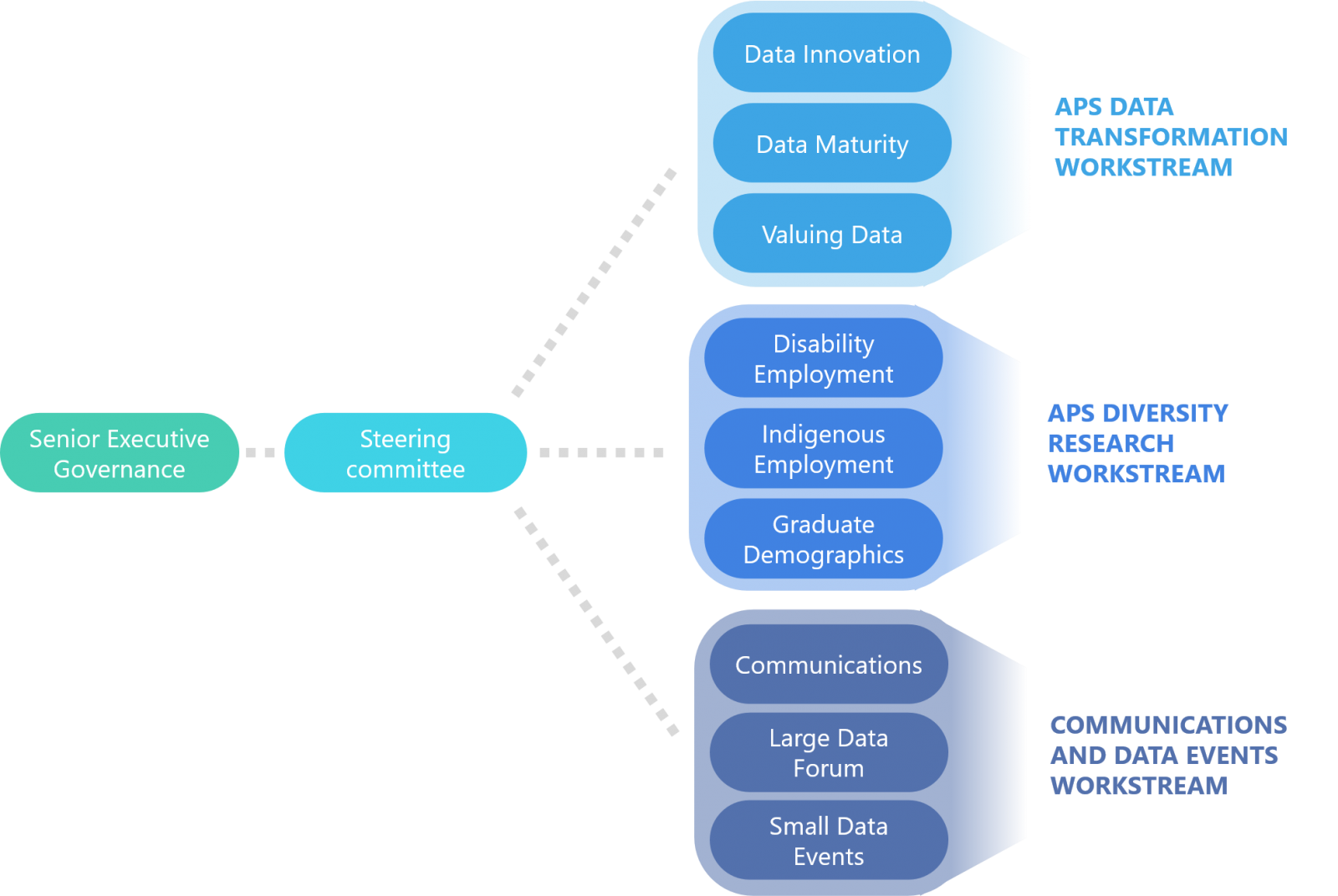Leadership roles
The leadership roles within the Graduate Data Network include Steering Committee members and Working Group Leads:
Steering Committee member
- Helps set the strategic direction and work program of the Graduate Data Network
- Drives the GDN’s agenda and approves each working group deliverable
- Updates the Steering Committee on the progress of the working groups and identifies any issues
- Provides direction and guidance to members of the GDN.
Working Group lead
- Coordinates working groups
- Liaises with relevant stakeholders
- Ensures working group products are delivered on time and to a high standard
Work program
Each year, the GDN delivers projects to support our core objectives. In 2022, over 150 members will deliver 9 projects within 3 workstreams.
Communications and Data Events
These working groups set up, host and promote the network’s events, work program and professional development opportunities to enhance the GDN’s outreach and influence. The three working groups and their objectives are as follows:
- Communications – Spread data awareness in the APS through newsletters, social media, and other outreach. This group provides regular updates and data-related news to GDN members in order to increase the GDN’s reach and empower more graduates to champion data use and capability.
- Small Data Events - Plan and host panel sessions, mentoring events, workshops and other events for APS graduates interested in data. These small-scale events provide graduates with opportunities to engage in thought-provoking discussions on data, to upskill, to find mentors and to network with Senior Executives, academics, other graduates and members of the general public.
- Large Data Forum - Plan and host the 2022 Graduate Data Forum, the GDN’s landmark annual event that gives graduates the opportunity to hear from thought leaders in the data sector. This conference has been held both in-person and digitally in the past, with the 2021 forum attracting a wide range of data experts from the APS and academia.
APS Data Transformation
This workstream will work closely with senior APS data leaders to explore how the APS uses data and recommend new ways of working with data. In this workstream, the three working groups and their objectives are as follows:
- Data Maturity – Analyse how effectively agencies are using their data and highlight key opportunity areas. This will help to inform a set of minimum data governance standards and deliver a self-assessment tool for agencies to independently measure their data maturity.
- Data Innovation – Report on case studies which demonstrate how APS agencies are using data in new and interesting ways. These examples will be drawn upon to increase recognition of data ‘success stories’ and progress innovative data use in the APS.
- Valuing Data - Research and report on the importance of data to the APS and explore how we could better value, use and share data. This working group intends to highlight prospective uses of data and instances where potential value is not currently being realised.
APS Diversity Research
This workstream will work with the Australian Public Service Commission (APSC) to research APS workforce demographics and help make the APS a more diverse and inclusive workforce.
- Disability Employment – Provide insights into the experiences of employees with a disability in the APS and highlight case studies or success stories which depict how qualitative data is currently being used in different APS agencies to aid employees with a disability. This aims to help improve outcomes for employees with a disability and identify gaps in qualitative information on employees with a disability.
- Aboriginal and Torres Strait Islander Employment – Harness different data sources to understand the representation and experiences of Aboriginal and Torres Strait employees across the APS. This aims to foster diverse and inclusive workplaces for Indigenous employees, increase Indigenous employee representation and retention and support APS-wide reconciliation efforts.
- Graduate Demographics – Use APSC and survey data to provide a snapshot of the demographic makeup of graduate cohorts and insights into graduate experiences. This aims to improve the experience of APS graduates by informing executives, graduate coordinators, the broader APS, and prospective applicants to APS graduate programs.


